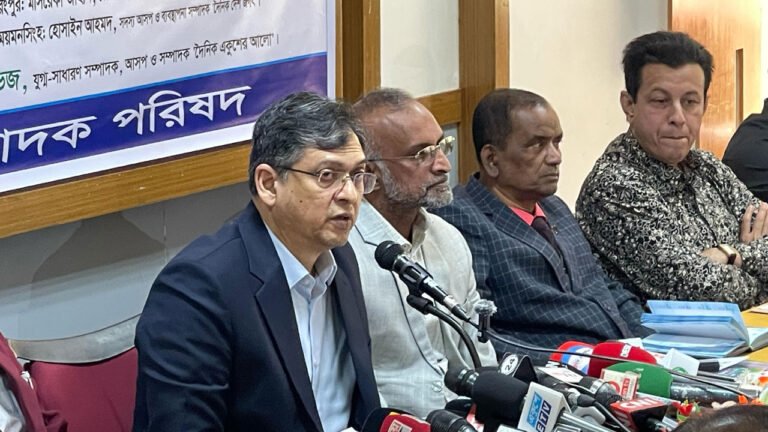Salahuddin Ahmed, a permanent member of the BNP’s Standing Committee, declared that the people of Bangladesh have rejected the Awami League through a mass uprising and have driven them out of the political arena. He emphasized that the Awami League should no longer be allowed to engage in politics under that name in Bangladesh.
Addressing a seminar titled ‘National Unity and Current Realities’ organized by the Regional Editors’ Council at the National Press Club on Wednesday, February 5, Ahmed further demanded that the Awami League be held accountable for its alleged involvement in genocide and crimes against humanity, urging that the party face legal proceedings to determine if it should be permitted to participate in the nation’s politics and elections.
“We demand judgment for the Awami League’s actions as a political organization,” he said. “Let the judicial process decide whether the Awami League can participate in Bangladesh’s politics and elections. Prepare the law in accordance with the Constitution.”
In his speech, Salahuddin Ahmed questioned the government’s strategy of using police to block the Awami League on the streets. “How long will you continue using the police to keep the Awami League off the streets? You say that the Awami League should not be allowed to participate in politics, but what steps are being taken?” he asked. He criticized the government for not taking any significant action regarding his earlier call to ban the party under Article 47 of the Constitution.
Ahmed also pointed out contradictions in the government’s position. “On one hand, you say the Awami League should be banned from politics, but on the other, you are not taking any action. You are blocking them with the police but avoiding judgment. This contradiction is problematic,” he remarked.
He warned that the current political system could not succeed if it continued harboring those connected with fascism. According to him, the administration, judiciary, and electoral system need to be purged of such elements to ensure a democratic future.
Salahuddin Ahmed reiterated the need for comprehensive electoral reforms and pointed out that the BNP had already presented a 31-point reform proposal in 2011, aimed at restoring a neutral caretaker government. “We must make electoral reforms a priority for the democratic political process,” he stressed.
He also warned that the people would not tolerate delays in the reform process. He stated that a new voters’ list should be ready soon, followed by boundary delimitation and other legal processes, and that these tasks could be completed without significant delays. “The people demand a government that is elected by the voters,” he declared.
The BNP leader called on the interim government to quickly provide an electoral roadmap after discussions with all stakeholders, suggesting that elections could be held in July or August if legal and institutional reforms were implemented beforehand. “We should not mix up elections and reforms. Both should proceed together, with reforms being an ongoing process,” he added.
Finally, in response to comments about Sheikh Hasina’s alleged financial involvement in inciting chaos abroad, Salahuddin questioned the influence of Hasina’s allies in the current administration. “The people who are loyal to Sheikh Hasina are still in high positions in the administration. How can you succeed when these elements remain in power?” he asked.
The event was chaired by Khaled Saifullah Sohel Khan, president of the Regional Editors’ Council, with the session being moderated by Salim Parvez, joint general secretary of the organization. Additionally, Fazlur Rahman, an adviser to the BNP chairperson, also spoke at the event.



